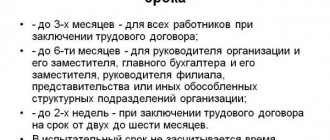When concluding an employment contract, by agreement of the parties, it may include a provision for testing the employee in order to verify his compliance with the assigned work.
The absence of a probationary clause in the employment contract means that the employee was hired without a trial. In the event that an employee is actually allowed to work without drawing up an employment contract (part two of Article of this Code), the probationary clause can be included in the employment contract only if the parties formalized it in the form of a separate agreement before the start of work.
During the probationary period, the employee is subject to the provisions of labor legislation and other regulatory legal acts containing labor law norms, collective agreements, agreements, and local regulations.
A hiring test is not established for:
persons elected through a competition to fill the relevant position, conducted in the manner established by labor legislation and other regulatory legal acts containing labor law norms;
pregnant women and women with children under the age of one and a half years;
persons under the age of eighteen;
persons who have received secondary vocational education or higher education in state-accredited educational programs and are entering work for the first time in the acquired specialty within one year from the date of receiving vocational education at the appropriate level;
persons elected to elective positions for paid work;
persons invited to work by way of transfer from another employer as agreed between employers;
persons concluding an employment contract for a period of up to two months;
other persons in cases provided for by this Code, other federal laws, and a collective agreement.
The probationary period cannot exceed three months, and for heads of organizations and their deputies, chief accountants and their deputies, heads of branches, representative offices or other separate structural divisions of organizations - six months, unless otherwise established by federal law.
When concluding an employment contract for a period of two to six months, the probationary period cannot exceed two weeks.
The period of temporary incapacity for work and other periods when the employee was actually absent from work are not included in the probationary period.
Article 69
Article 70
Article 71
When does Article 70 of the Labor Code of the Russian Federation allow an employer to establish testing procedures?
Article 70 of the Labor Code of the Russian Federation provides for the possibility of including a clause on a probationary period in an employment contract. It stipulates the following conditions:
- the probationary period is established by agreement of the parties;
- the presence of a probationary period and its duration are specified separately in the employment contract;
- Test procedures are aimed at checking the compliance of the employee’s skills and abilities with the job duties assigned to him.
In fact, employers usually only fulfill the second of these conditions.
The question of reaching an agreement between the parties to the employment contract in this situation is usually not even raised. The employee is given the opportunity to choose:
- or agree to the “test” condition set;
- or look for another job.
As for the purposes of testing procedures, different employers have their own:
- Some company managers really want to make sure the competence of the hired employee.
- However, other employers use legally permitted probationary procedures to their advantage - in order to save on wages by setting a minimum wage for the maximum permitted probationary period. In this case, the actual competence of the employee and his skills are not taken into account.
Why and for whom is a probationary clause necessary in an employment contract?
The probationary period is important for both parties to the employment contract. It allows the employer:
- take a closer look at the new member of the work team;
- assess the skills, abilities, knowledge and competence of the employee;
- compare the employee’s level of training with the requirements that are placed on him when performing his job duties;
- make an informed decision about the employee’s suitability for the position offered to him.
This period is no less significant for the employee. During the probationary period he can:
- legally gain experience from more qualified company employees;
- analyze your abilities in relation to this position;
- study the general organizational and personalized nuances of working for a given employer;
- make a decision about the ability to work effectively and the acceptability of the atmosphere in the company (or conclude in time that it is necessary to part with this employer).
What does the absence of a “test” clause in the contract mean?
Art. 70 of the Labor Code of the Russian Federation does not allow any liberties with regard to test procedures. For example, an oral agreement between the parties to an employment contract to establish a probationary period has no legal force.
IMPORTANT! If the employment contract does not contain a clause on a probationary period, this means that the employee was hired without a trial.
Article 70 of the Labor Code of the Russian Federation protects the interests of an employee if he is forced to begin performing work duties without drawing up an employment contract with him.
IMPORTANT! If an employee is allowed to work, but an employment contract has not been drawn up with him, the clause on the probationary period must be included in the contract only in 1 case: if a probationary agreement was signed before the start of work.
Thus, the employer should not delay the execution of the employment contract. Then the test clause included therein will be enforceable.
Article 70 of the Labor Code of the Russian Federation. Employment test
1. Article 70 of the Labor Code of the Russian Federation states that the purpose of the hiring test is to check the employee’s suitability for the work assigned to him. A probationary agreement is one of the additional terms of an employment contract. Therefore, it must be indicated in the employment contract itself, if the parties have agreed on such a condition. It is the employment contract that is the basis for issuing an order for employment with a probationary period. If the test condition was not agreed upon when concluding the employment contract and is not provided for in it, it is considered that the employee was hired without a test. The employer does not have the right to set a probationary period for the employee by order of hiring, if the employment contract does not provide for a probationary period.
An exception to this general rule is in cases where an employee is actually allowed to work without drawing up an employment contract. In such a situation, when the employment contract is subsequently drawn up in writing, a condition on a probationary period may be included in it, but only if, before the start of work, the parties agreed that the employee would be hired on a probationary period, and formalized this agreement in a separate agreement (i.e. in writing). Thus, this exception does not affect the general principle of establishing a probationary period for an employee, i.e. by agreement of the parties.
2. During the probationary period, the employee is fully subject to the provisions of legislation and other regulatory legal acts containing labor law norms, agreements and a collective agreement, if adopted by the organization. During this period, the employee is obliged to obey the internal labor regulations, he has the right to payment of wages in full, to temporary disability benefits, etc.
In turn, the employer has the right to demand from the employee the fulfillment of all obligations stipulated by the employment contract, as well as, on his own initiative, to terminate the employment contract with the employee during the probationary period on any basis provided for by the Labor Code in compliance with all established conditions.
Thus, if an employee hired on a probationary period is subject to dismissal from work before the expiration of the probationary period due to a reduction in the number or staff of employees, the dismissal must be carried out in compliance with all the conditions provided for employees dismissed on this basis (see commentary to Art. 81, 178, 180).
3. Part 4 art. 70 of the Labor Code of the Russian Federation defines the category of persons for whom a test cannot be established when hiring.
The list of these persons provided for in the commented article is not exhaustive. The Labor Code, federal laws and collective agreements may establish other cases when a probationary period is not established when hiring.
If a test condition was provided for in relation to a person for whom, in accordance with Part 4 of Article 70 of the Labor Code of the Russian Federation, a test upon hiring cannot be established, it should not be applied, even if this person does not object to such a condition.
This provision is based on Art. 9 of the Labor Code, according to which collective agreements, agreements, and employment contracts cannot contain conditions that limit the rights or reduce the level of guarantees of workers in comparison with those established by labor legislation and other regulatory legal acts containing labor law norms. If such conditions are included in a collective agreement, agreement or employment contract, then they are not subject to application.
4. Part 5 of this article establishes the deadlines for testing when hiring. As a general rule, it cannot exceed 3 months. A probationary period of longer duration, but not more than 6 months, can be established for the head of the organization, his deputies, the chief accountant and his deputies, the head of a branch, representative office or other separate structural unit. A different probationary period for employment for these workers may be established by federal law.
Since, from the point of view of civil law, separate structural units are branches and representative offices of a legal entity and nothing more, it should be assumed that a probationary period of more than 3 (up to 6) months can be established for the heads of only these structural units (see Article 55 of the Civil Code) . In this regard, a probationary period of up to 6 months cannot be established, for example, for the head of a workshop, department, sector and other similar structural units, regardless of the degree of their isolation.
The Labor Code and other federal laws may establish others, incl. minimum or maximum test periods. Thus, according to Part 6 of the commented article, when concluding an employment contract for a period of 2 to 6 months, the trial period cannot exceed 2 weeks. In accordance with Art. 27 of the Law on State Civil Service, civil servants may be subject to probation for a period of 3 months to one year.
Within the established deadlines, the parties to the employment contract themselves determine its specific duration.
5. The probationary period begins to run from the first day of work. In accordance with Part 7 of Article 70 of the Labor Code of the Russian Federation, all periods when the employee was actually absent from work are not included in the probationary period. These may be periods of temporary disability, being on short-term leave without pay or on leave in connection with training, performing state or public duties, etc. After the break, the probationary period continues. The total duration of the probationary period before and after the break should not exceed the period stipulated in the employment contract.
Within the meaning of the commented article, the probationary period should not include any periods when the employee was actually absent from work, incl. and without good reason (for example, a period of absenteeism).
At the same time, it should be borne in mind that for violation of labor discipline during the probationary period, disciplinary measures provided for by the Labor Code may be applied to the employee, incl. dismissal (see commentary to Article 81).
Who is not subject to probation?
The list of employees who cannot be given a probationary period when hired is given in Art. 70 Labor Code of the Russian Federation:
- persons elected to vacant positions based on the results of a competition;
- women with children under 1.5 years of age;
- women expecting the birth of a baby;
- working teenagers (under 18 years of age);
- graduates of colleges and universities (with state accreditation) who first entered work within 12 months after graduation;
- employees transferred from another company (by mutual agreement of employers);
- other persons (in accordance with the law).
Taking into account this list, it is important for the employer to establish a probationary clause in the contract in a balanced manner and in accordance with the law.
If a probation clause is included in an employment contract with specified persons, the company and its director may face punishment under Art. 5.27 of the Code of Administrative Offenses of the Russian Federation - from a warning to the imposition of a fine in the amount of 30,000–50,000 rubles. per company and 1,000–5,000 rubles. to the leader.
What should an employer do if a “probationary” employee is pregnant, see the article “Can a pregnant woman be fired during a probationary period?”
End of term and dismissal
Upon completion of the test, one of the following decisions is made:
- Passed satisfactorily and the employee continues to work at this workplace - in this case, no additional documents are drawn up, the employee continues to work in the team under the same conditions.
- The employee is not satisfied with the job and resigns of his own free will - requires notification of the employer about his desire to resign three days before the date of dismissal (Part 4 of Article 71 of the Labor Code). Then an application is drawn up in free form, the contract is terminated at one’s own request (Clause 3, Part 1, Article 77 of the Labor Code) with payment of the due amounts of earnings, compensation for unused vacation for the actual number of days worked and severance pay, if provided for by local regulations.
- The result is unsatisfactory, entailing termination of the employment relationship - upon completion of the probationary period with an unsatisfactory assessment, the employment contract is terminated at the request of the employer (Part 1 of Article 71 of the Labor Code). In this case, the following order should be observed:
- check all documents drawn up upon hiring for the procedure for establishing the test;
- obtain documentary evidence of professional unsuitability;
- notify the employee in writing of your intention to terminate your employment relationship on the grounds of unsatisfactory completion of the test three days before the date of dismissal;
- issue an order to terminate the employment agreement;
- make an entry in the work book and T-2 card. Return the work book to the employee on the day of dismissal;
- make a full settlement with the person being dismissed.
Dismissal during a probationary period of one's own free will
How long does the trial period last for a fixed-term employment contract?
If an employee is hired not on a permanent basis, but for a certain period, Art. 70 of the Labor Code of the Russian Federation limits the appetite of the company’s administration regarding the duration of the test period.
IMPORTANT! The trial cannot last more than 2 weeks if the employment contract is concluded for a period of 2 months to six months.
By introducing this restriction, legislators stopped possible abuses by companies in the form of establishing a probationary period equal to the period of duration of the employment relationship.
Whether a trial period can be established for civil servants, see the article “Probationary period for employment (nuances).”
Rights and responsibilities during the test
At the time of verification of the employee, according to Art. 70 of the Labor Code of the Russian Federation, all labor standards apply. It is worth saying that at one time some employers practiced non-payment of wages to citizens during the probationary period or payment of smaller amounts than required. Such actions should be regarded as unlawful.
An employee on a probationary period can expect to receive a salary, disability benefits and other payments established by law. At the same time, he acquires a number of responsibilities. In particular, he must comply with the rules established by the enterprise, perform labor functions efficiently and on time, etc.
The employer, in turn, has the right to demand that the candidate comply with discipline and other obligations established by law. The employer is also obliged to pay the amounts due to the employee, including benefits and wages.
For what periods can the probationary period be extended?
Art. 70 of the Labor Code of the Russian Federation not only guards the interests of the subjects, but also takes into account the reasonable requests of the employer.
Taking into account the importance of the employer assessing the competence of the employee being hired and whether he has the necessary skills, the legislator has provided a special bonus for companies.
IMPORTANT! If during the probationary period the subject fell ill or was absent from the workplace for any reason, the time of such absence is not counted towards the probationary period.
With this provision, the legislator stopped abuses by employees associated with their desire to shorten their probationary period.
You can find more complete information on the topic in ConsultantPlus. Free trial access to the system for 2 days.










